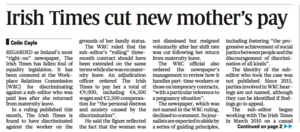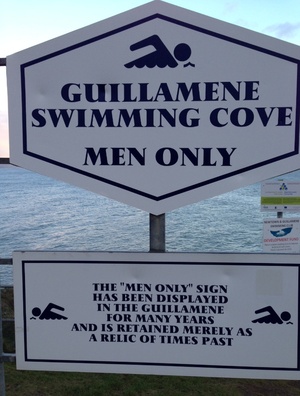Tag Archives: Discrimination
A very impressive 15 minute short by Australian director Christopher Weekes, featuring Rose Byrne and Bobby Cannavale, blending live action with seamless VFX and puppetry to tell a dark tale of identity, discrimination and ultimately, self acceptance.
It’s not Sesame-Street.
Yesterday’s Sunday Times
Yesterday.
The Sunday Times reported that The Irish Times was censured by the Workplace Relations Commission after it was found to have discriminated against a female sub-editor by cutting her shift rate after she returned from maternity leave.
The newspaper was ordered to pay her a total of €9,000 – €6,500 in wages and €2,500 compensation for the personal distress and anxiety caused.
The judgment can be read in full here.
Further to this…
Anon writes:
It’s interesting to note The Irish Times’ approach to regularly reporting cases of discrimination from the Workplace Relations Commission and the Equality Tribunal, as well as their constant commentary on this form of discrimination.
See here and here for examples of such reporting.
On December, 5th, 2016, seven days before the Workplace Relations Commission ruled that The Irish Times had discriminated against a new mother, The Irish Times ran an editorial with the headline: ‘We need an all-Ireland campaign to promote equality for working mother’ in which it said:
While tougher laws may play a role, real progress in equality for pregnant women will only come through targeted efforts to change the workplace culture and a real shift in the societal expectation of working parents. We should start with an all-island campaign promoting equality for working mothers and pregnant women.
In addition, so appalled by discrimination against working mothers, The Irish Times is very fond of promoting NGO research and case studies that show how pregnant women continuously face discrimination in the workplace:
From November 29, 2016, in an article headlined “Half of women in North say careers damaged after pregnancy”, it stated:
More than a third of women in Northern Ireland said they were treated unfairly or disadvantaged due to pregnancy or taking maternity leave, according to a survey carried out by the North’s Equality Commission.
From August 14, 2015, in an article headlined “Pregnant and working? You may still face discrimination”, it stated:
A recent comprehensive study has found, however, that both pregnancy and maternity are also times when women can face increased discrimination in the workplace.
The study of more than 3,200 women, which was conducted by the Equality and Human Rights Commission in the UK, found that 11 per cent of the women interviewed reported having been dismissed, made compulsorily redundant where others were not, or treated so poorly that they felt they had little choice but to leave their jobs.
The survey’s authors suggest that if replicated across the whole of the population, it could mean that up to 54,000 women may be forced out of the workplace in Britain each year.
From December 2, 2014, in an article headlined “Pregnancy is a full-time job for working women”, it stated:
Up to 30 per cent of women feel they have been treated unfairly during pregnancy, according to a national survey of pregnancy at work published in 2011 by the HSE Crisis Pregnancy Programme and the Equality Authority.
At its most extreme, this involved dismissal, which 5 per cent of women reported. Others felt they had lost out on salary, bonuses or promotion, had endured unpleasant comments from managers and/or co-workers, or had been discouraged from exercising their right to attend antenatal appointments during work time.
And so to the obvious question.
Given The Irish Times’ pronounced and indisputable consternation over the amount of discrimination new and expectant mothers face in the workplace, has the paper of record reported the judgement from the case that involves themselves?
Of course not.
Irish Times cut new mothers’ pay (Sunday Times)
As a woman about to sit final-year law exams, I read the Bar of Ireland’s research into barriers facing women barristers with great interest and much hope that it signalled change.
Of all my classmates, I am the only woman considering a career at the bar. Women who do not plan to go to the bar cite the same reasons women have been citing in similar research down through the years – discrimination, childcare issues, and so on.
Friends of mine have told me they cannot speak up on these matters, for fear of being branded “difficult” and receiving even less work.
The Bar of Ireland’s research is welcome, but far from ground-breaking, and is almost unnecessary in that it reveals little new.
I hope, as I imagine do most women studying law, that it signals the beginning of a huge cultural change at the bar, because nothing else will suffice.
The time has passed for research, and the time has long since come for action.
Ciara Ní Ghabhann,
Corofin,
Co Galway.
Discrimination at the bar (Irish Times letters page)
Related: Two in three women barristers face discrimination, study finds (Irish Times)
Pic: Telegraph
Relic
at Mick writes:
Mick writes:
Saw this lad at Newlands Cross [Dublin] this week. Hope he gets sorted…
Lydia Morgan writes:
I had a little chat with him his name is Brendan Coleman from Wexford he has 20 years sales experience but can’t seem to find employment due to his age. He is a very brave man for putting himself put there. I am hoping a lot of people share his story and he gets good exposure. Please share his photo and number [086 6065566]
Lydia via 2fm Facebook. Thanks Roomicube









